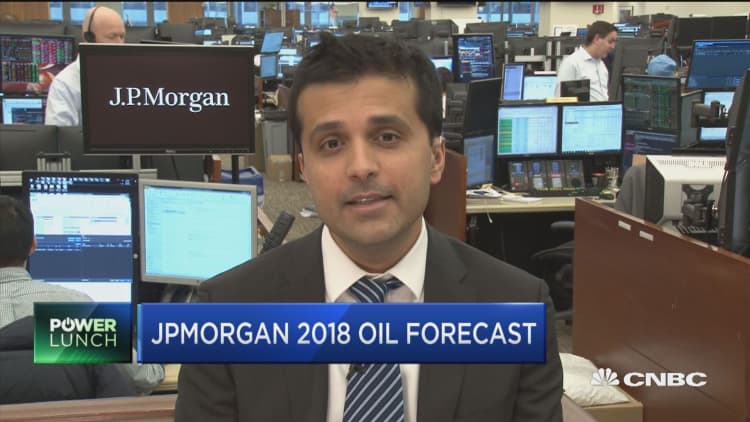Oil prices fell for a second day on Tuesday, driven by ongoing evidence of rising U.S. crude output, while wary investors sold off stocks, bonds and commodities.
U.S. West Texas Intermediate futures ended Tuesday's trade down $1.06, or 1.6 percent, at $64.50 a barrel. Brent crude futures fell 45 cents to $69.01 a barrel by 2:29 a.m. ET.
"There are so many longs in the market that they're now taking profits," said Tariq Zahir, analyst at Tyche Capital Advisors, referring to traders who have placed wagers that oil prices will keep rising. "This could just be a one-day thing before we start to see a move to the upside again."
U.S. blue-chip stocks opened under pressure, weighed down by a jump in government bond yields and an earlier rise in the dollar.
With oil's negative correlation to the dollar reaching its strongest in a month, even continued signs of robust demand for crude were not enough to ward off profit taking following last week's rise to three-year highs.

"I do have the feeling that market optimism pushed prices perhaps a little bit too high, but ... as long as (inventories) continue to decline, for me, personally, I'm more and more looking at a 'buy-on-dips' strategy, so I'm looking for a correction lower," ABN Amro chief energy economist Hans van Cleef said.
Oil's inverse relationship to the dollar, whereby a stronger currency makes it more expensive for non-U.S. investors to buy dollar-denominated assets, has reasserted itself this week.
"Correlations are funny things. Sometimes they work and sometimes they don't. For most of 2017, the relationship between the dollar and the oil price was not obvious," PVM Oil Associates strategist Tamas Varga said in a note.
"This is the trend that seems to be turning, judging by yesterday's price action and this morning's moves."
Expectations for U.S. inventories to rise for the first time in 11 weeks may also be keeping oil under pressure, according to a preliminary poll by Reuters on Monday.
U.S. production is already on par with that of Saudi Arabia, the biggest producer in the Organization of the Petroleum Exporting Countries (OPEC). Only Russia produces more, averaging 10.98 million barrels per day (bpd) in 2017.

"The global trend seems to be indicating more oil is coming into the market despite best efforts by the Saudis and Russians to curtail output," said John Kilduff, partner at Again Capital LLC in New York.
U.S. output has jumped more than 17 percent since mid-2016 and is expected to exceed 10 million bpd soon.
The rising tide of U.S. oil output comes after prices rose following an agreement by OPEC producers, along with Russia and other countries, on output curbs.
"As drilling activity now picks up again, oil production looks set to increase in the coming months. The U.S. Energy Information Administration (EIA) expects production in the U.S. to grow by just shy of 1 million bpd this year," Commerzbank said in a note.
"Since oil production is also on the increase elsewhere especially in Canada and Brazil non-OPEC supply is even likely to outpace global demand. This means OPEC will lose market shares and have no scope whatsoever for stepping up production."

